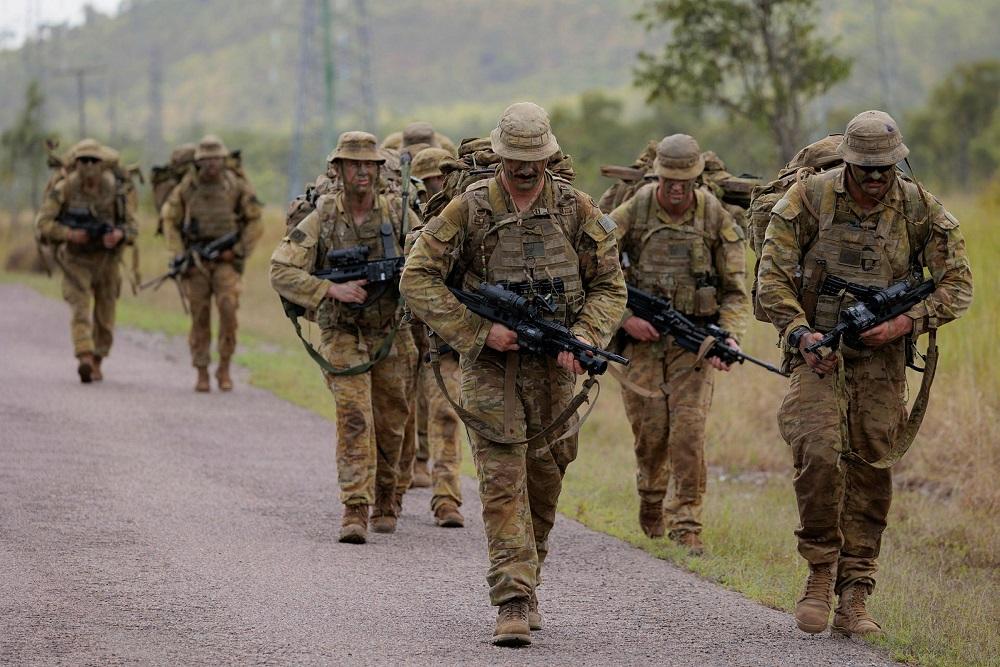Parliament’s power and the war powers
Posted By Graeme Dobell on November 14, 2022 @ 06:00

To examine how Australia goes to war, parliament must examine itself.
How much can parliament touch the war prerogative of the prime minister and cabinet?
What say should parliament have, if any, in the most fundamental choice a nation can make?
How much are the parties of government—Labor and the Liberal–National Coalition—ready to nod to parliament as the basis of their power and legitimacy?
Parliamentary inquiries seldom sail so close to the fundamentals.
The Joint Standing Committee on Foreign Affairs, Defence and Trade is pondering ‘how Australia makes decisions [1] to send service personnel into international armed conflict’. Senators and members of the House of Representatives must question themselves and their institution as well as the witnesses and submissions. The review will wrestle with issues that echo down [2] our 120 years of federation.
The tensions are plain in the terms of reference [3] drawn-up by Deputy Prime Minister and Defence Minister Richard Marles—and starkly expressed in his reference letter [4] to the committee. Marles warned the committee against any move to weaken cabinet’s right to go to war:
[U]nder Australia’s Westminster system of government, decisions about the deployment of the ADF into international armed conflicts are within the prerogative powers of the Executive. I am firmly of the view that these arrangements are appropriate and should not be disturbed.
Holding the inquiry honours a Labor election promise, but Marles’s do-not- disturb injunction means Labor’s leadership has a unity ticket with the Coalition. The Coalition argument is that cabinet’s national security powers ‘can’t be hamstrung by the parliament [5]’.
The parties of government want no formal change to their power to govern. The Labor–Coalition consensus is set to block any change in law to give parliament a veto over the war power.
See the case for the veto in a submission by Australians for War Powers Reform [6]. It recommends changes to the Defence Act requiring a ‘debate and vote in both houses of parliament before Australian forces are committed to overseas conflict, in all circumstances except defence against a direct attack on Australia or in response to a resolution of the UN Security Council’.
The Labor–Coalition consensus means there’ll be no change of the Defence Act. But that political reality offers a place to start, not an end. This is an inquiry that requires parliament to think about itself as well as the rights of the executive.
Rather than pushing against the constitution and the executive’s profound prerogative [7] for war, parliament should build on its history to codify conventions [8]. Seek to ‘parliamentarise [9]’ the war powers.
The call for both houses of parliament to vote on war crashes against the fact that Australian governments seldom command a majority in the Senate. Neither Labor nor the Coalition will give another iota of power to the upper house.
By contrast, a convention for a war vote in the lower house already exists. The inquiry merely needs to note the precedent in the House of Representatives and call on future governments to follow it.
Codify that convention, based on John Howard’s ANZUS and Iraq [8] precedents: the war resolutions passed by the House of Representatives following the 9/11 attacks on the US and the Iraq invasion. The Howard precedent is that the resolution can be passed before the shooting starts (ANZUS) or after the war is launched (Iraq).
Aim for a checklist if not a legal check when war is launched. And use the checklist for greater parliamentary oversight of the way war is waged.
Marles pointed in that direction in his reference letter, writing that parliament has ‘an important role for public discussion and scrutiny’ when the Australian Defence Force is deployed abroad:
Governments have typically, as a matter of practice rather than necessity, provided explanations to the Parliament of their decisions to deploy the ADF into hostilities abroad. This has provided an important opportunity for scrutiny by the Parliament of such decisions.
Turning to parliamentary convention, not law, isn’t a lesser option.
Australia’s parliament is a robust and responsive beast. Adopting the convention solution plays to parliament’s strengths and history, avoiding complex arguments about enacting laws that could shackle government action and slow military responses. As just one example of the complexity, drafting purgatory threatens any attempt to legislate different approaches to ‘wars of necessity’ and ‘wars of choice’. Did World War II start as a war of choice and then become a necessity after Japan arrived?
History tells the story of what the robust Australian parliament can do, even during our worst conflicts.
When World War I broke out, Australia was in the midst of an election campaign that changed the government; losses at the front and the conscription referendum at home smashed that Labor government. In World War II, a collapsing government discarded its prime minister (Robert Menzies) and shortly after lost office in a vote of confidence in the House of Representatives.
As US General Douglas MacArthur remarked in Canberra in 1942 after witnessing a ‘fierce debate’ [10] in the House on the government’s use of its war powers on the home front, ‘If the men of Australia fight as well as they argue, we are certain of victory.’
Australia’s parliamentary democracy delivers, even when the times are dire. And that means the rights of parliament that already exist should be strengthened by being codified. Build new parliamentary conventions into the Australian way to war.
Article printed from The Strategist: https://aspistrategist.ru
URL to article: /parliaments-power-and-the-war-powers/
URLs in this post:
[1] how Australia makes decisions: https://www.aph.gov.au/Parliamentary_Business/Committees/Joint/Foreign_Affairs_Defence_and_Trade/Armedconflict
[2] echo down: /parliament-ponders-the-way-australia-goes-to-war/
[3] terms of reference: https://www.aph.gov.au/Parliamentary_Business/Committees/Joint/Foreign_Affairs_Defence_and_Trade/Armedconflict/Terms_of_Reference
[4] reference letter: https://www.aph.gov.au/DocumentStore.ashx?id=147af261-3c2a-4757-ba1f-0d9bc5aa8d20
[5] hamstrung by the parliament: https://www.theguardian.com/australia-news/2022/oct/05/coalition-warns-against-requiring-parliamentary-vote-to-commit-australia-to-war
[6] submission by Australians for War Powers Reform: https://www.aph.gov.au/Parliamentary_Business/Committees/Joint/Foreign_Affairs_Defence_and_Trade/Armedconflict/Submissions
[7] profound prerogative: /the-prime-ministers-prerogative-to-send-australia-to-war/
[8] codify conventions: /creating-parliamentary-conventions-for-the-australian-way-to-war/
[9] parliamentarise: /parliament-and-the-australian-way-of-war/
[10] ‘fierce debate’: https://www.google.com.au/books/edition/Breaking_the_News/ZOg_AAAACAAJ?hl=en
Click here to print.